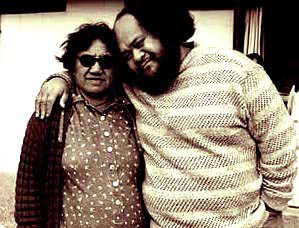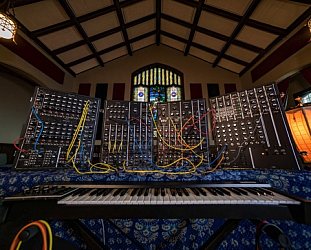Graham Reid | | 2 min read

It's a fair if not entirely original
observation that the late Dalvanius Prime made an immediate
impression. I'll never forget the day we shook hands in Patea. The
big man was, typically, wearing his body-hugging pink tracksuit.
Back at his modest, almost alarmingly
small home he showed me his memorabilia and treasures, and was
especially proud of the magnificent image of King Tut framed in his
bedroom. On closer inspection, it was a towel he'd bought in London.
That was typical of Dalvanius: he could
elevate the ordinary into art.
Dal was the fifth child of 10 born to
what he admited was a boozy, party-every-night family before his
father re-embraced the Mormon faith.
Then it was hymns instead of pop songs,
and Dal was sent to the Mormon College in Hamilton where he excelled
in animal husbandry.
But he felt the call of music so fled
to Wellington and hooked up with the Shevelles, precociously guiding
their career as a kind of Maori Supremes.
Then it was Australia and constant
performing as Dalvanius and the Fascinations where the big man and
that beautiful voice took centre stage for many years, including at
the opening night of the Sydney Opera House.
These were the years he honed his craft
but it wasn't until his return to New Zealand - prompted by the death
of his mother - that Maui Carlyle Dalvanius Prime fully came into his
own as producer (for Prince Tui Teka), songwriter, singer and
cultural icon.
With Ngoi Ngoi Pewhairangi of Ngati
Porou he wrote the remarkably durable Poi E which Patea Maori Club
recorded. It took them to London and New York (in London Dal learned
of Ngoi's death) but in many ways it was never quite followed up. The
delayed album arrived too late to take advantage of Poi E's
cross-cultural success.
Dalvanius was moving on anyway: there
was the opera, dreams of an animated television series featuring
Maori superheroes and mythological characters, the soundtracks for
Ngati and Te Rua, then his quiet, persuasive and articulate campaigns
for the return of mokomokai from museums around the world.
Dalvanius' was a remarkable story,and
his legacy is far reaching. Poi E alone, the first single in te reo
to top the New Zealand charts and funded by local businesses because
the major record companies wouldn't touch it, inspired a thousand
young Maori singers and songwriters because now they could see
anything was possible.
Dal – in his life and art, both of
which elevated the ordinary – proved it.






post a comment